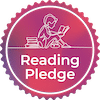Five from Five is a community education initiative of MultiLit, founded by Dr Jennifer Buckingham OAM. Five from Five aims to promote effective, evidence-based reading instruction, by providing free resources to teachers, principals and parents and advocating for evidence-based policy with politicians and policy makers. For more information visit fivefromfive.com.au.

New push to improve secondary school literacy as fresh data reveals thousands are struggling to read
Almost 90,000 students are starting secondary school each year without adequate literacy skills, sparking calls for government and school sector authorities to back a new initiative to ensure students get the support they need to learn to read.
Five from Five, a community education initiative of MultiLit, together with Learning Difficulties Australia have unveiled a new roadmap to reduce to near zero the number of children who finish primary school unable to read.
The Reading Pledge, which follows the successful Primary Reading Pledge launched in 2020, provides both primary and secondary school teachers with guidance on the training and resources they need to deliver targeted assessments and interventions to address the needs of students who are struggling.
Five from Five founder Dr Jennifer Buckingham OAM said it was unacceptable that such a large number of secondary schoolers lacked the literacy skills needed to access the school curriculum.
“The latest NAPLAN data tells us that close to 90,000 students started their secondary studies with below-proficient literacy levels, meaning that there are hundreds of thousands of students aged 12 to 18 years in our school system who are currently struggling to read,” said Dr Buckingham.
“There is no excuse for children spending seven years in full-time education without learning to read.
“Every state and territory education minister must pledge to provide the keys to literacy to every child before they leave primary school and to do what is necessary to support those students still struggling in secondary school.”
“However, schools don’t have to wait for governments to change their policies. There are actions that can be taken by schools to provide support to students using evidence-based resources already available.”
The Reading Pledge provides an evidence-based framework for schools and school systems to reduce poor literacy rates, including guidance on intervention and assessment that is appropriate for secondary school.
Dr Buckingham said there was an extensive evidence base supporting the continued role of assessment, intervention, and monitoring in secondary schools.
“While it is unreasonable to expect all secondary teachers to have expertise in teaching reading, there are several ways in which literacy intervention and support can be effectively provided in secondary school settings,” she said.
“For example, a whole‑school approach, encompassing all subject areas, to improve reading outcomes is crucial – even in secondary school.
“Students with poor reading skills can be supported in all classes by explicit pre-teaching of vocabulary, use of student-friendly definitions and activities where word meanings can be explored, making morphology a focus to assist in vocabulary building, building background knowledge with texts at a lower reading level, and frequent checking for understanding in all classes with opportunities for discussion and debate.”
Learning Difficulties Australia President, Geoff Ongley, said the Reading Pledge was both a “wake up call” and a “call to action” for policymakers and educators.
“The impacts of poor literacy are catastrophic and typically lifelong – these students are less likely to complete school and face serious educational and social disadvantages.,” Mr Ongley said.
“Poor literacy outcomes are avoidable in most cases. Fortunately, they can generally be turned around with a commitment to evidence informed instruction, assessment, and intervention.”
“LDA is looking forward to politicians, policymakers, schools, teachers, parents, and the broader community, getting behind the Reading Pledge so that students can receive the support they need to learn to read in school.”